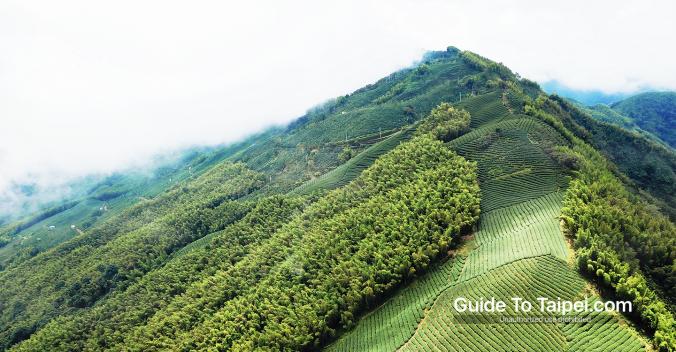
One of Taiwan's most famous exports, high mountain tea grown on the island is known worldwide for its high quality and deep natural flavors.
Ultimately, as an agricultural product, learning about the environment the tea is grown in can provide more understanding as to its nature.
The island of Taiwan (a.k.a. Formosa) is formed by the geologic collision of the Eurasian tectonic Plate, the Philippine Sea Plate, and the Ryuku Islands (Okinawa, Japan). As a result, the island is volcanically active and earthquake-prone. The eastern two thirds of the island is primarily mountain ranges and mainly uninhabitable. Taiwan's mountain ranges have been formed over millions of years as these geologic features collide under the surface and push upwards at an average of 2cm per year.
Some high mountain regions of Taiwan have developed agricultural industries, and high mountain tea farms can be found along each of the island’s mountain ranges. Each mountain range specializes in different types of tea, as tea strains have been developed to match the natural land and soil nutrient conditions. Some well-known strains include those from Ali-shan, Shanlinxi (Shanlinhsi or ‘Sun-Link-Sea’), and Li-shan, covering all fermentation levels such as green, black, and oolong teas.
Most teas from larger operations are harvested by machines, indiscriminately cutting the leaves for ease of packaging and lowering of production costs. However, in Taiwan some high mountain teas are expertly grown then harvested by hand to the correct specification of 'one tip, two leaf', resulting in more fragrant brewing. High mountain teas that are hand-picked and processed manually preserve their original shape to give the most complete brewing experience and are more difficult to find in the typical marketplace.
During Taiwan's post WW-II modernization, high mountain agriculture products were encouraged as an additional source of high-quality food. These products, grown in environments free of air pollution with clean, river water and volcanic, nutrient-rich soils, are still highly sought after in Taiwan. Tour groups heading to the mountains for the day may return home with a week's worth of vegetables such as cabbage or radish.
Taiwan has many earthquakes and tremors which may cause landslides. These landslides occurring at higher elevations have the potential to cause compounding disasters as boulders and other land masses can tumble down the mountains, destroying everything in their paths. Over time, mountain-side farms and plantations growing vegetables, tea, and other products such as beetle nut (similar to chewing tobacco) have been discouraged in favor of trees which stabilize the land.
Due to increased government regulation of land usage, especially with relation to forestry and landslide concerns, availability of high mountain tea has decreased. Major suppliers and brands now employ the practice of mixing quality Taiwanese leaves with those of southeast Asian countries. This mixing diminishes the flavor and essence of the nicer tea leaves and changes its brewed result. Genuine high mountain teas from Taiwan that are unadulterated and not mixed are of high quality, and this will be reflected in its pricing. Demand for high mountain Taiwanese tea now outweighs supply, therefore lower pricing of goods may indicate some shortcuts were taken during production.
High mountain teas from Taiwan are available for purchase in many shops, however it may be difficult to determine if the tea is 100% genuine high mountain tea, or if it has been mixed with lesser leaves. While shopping for Taiwan high mountain teas, please be aware of the source of the tea leaves, whether or not the leaves have been mixed with those from outside Taiwan, the packaging location, and if the leaves have passed industry inspection standards.